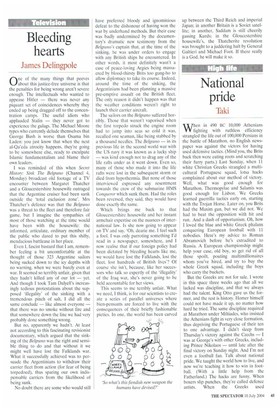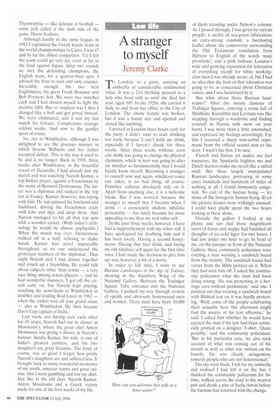National pride
Taki
When in 490 BC 10,000 Athenians fighting with ruthless efficiency strangled the life out of 100,000 Persians in the battle of Marathon, no English newspaper was against the victors for having used defensive tactics. (Mind you, the Brits back then were eating roots and scratching their furry parts.) Last Sunday, when 11 white Christian Greeks strangled a multicultural Portuguese squad, lotsa hacks complained about our method of victory. Well, what was good enough for Marathon, Thermopylae and Salamis was good enough for Lisbon. We Greeks learned guerrilla tactics early on, starting with the Trojan Horse. Later on, you Brits had the Maxim gun, but we did not. We had to beat the opposition with hit and run. And a dash of opportunism. Oh, how I loved the blue and white Greek phalanx conquering European football with 11 nobodies. Here's my advice to Roman Abramovich before he's extradited to Russia. A European championship might help your case, old boy, so get rid of all those spoilt, pouting multimillionaires whom you've hired, and try to buy the whole Greek squad, including the boys who carry the buckets.
But the Greeks are not for sale. I wrote in this space three weeks ago that all we lacked was discipline, and that we always had the talent. King Otto gave us the former, and the rest is history. Homer himself could not have made it up, no matter how hard he tried. The same discipline required at Marathon under Miltiades, who insisted the Athenians fight in very close formation, thus depriving the Portuguese of their ten to one advantage. I didn't sleep from Thursday's victory against the Czechs — I was at George's with other Greeks, including Prince Nikolaos — until late after the final victory on Sunday night. And I'm not even a football fan. Talk about national pride. We taught the world how to live, and now we're teaching it how to win in football. (With a little help from the Fatherland.) The hacks are funny. When boxers slip punches, they're called defence artists. When the Greeks used Thermopylae — like defence in football — some jerk called it the dark side of the game. Horse feathers.
Although hardly in the same league, in 1983 I captained the Greek karate team in the world championships in Cairo. I was 47 and by far the oldest competitor. Yet I felt the team could go very far, even as far as the final against Japan. After two rounds we met the defending champions, the English team, for a quarter-final spot. I advised the boys to wait and only counter. Incredibly enough, the two best Englishmen, the great Frank Brannen and Bob Poynton, lost. We were two matches each and I had chosen myself to fight the decisive fifth. But so inspired was I that I charged like a bull and got gored instead. We were eliminated, and it was my last match for Greece. Conspicuous courage seldom works. And now to the gentler sport of tennis.
No, not to Wimbledon, although I was delighted to see the gracious manner in which Serena Williams and her father accepted defeat. This is the way it used to be and is no longer. Back in 1958, three weeks after Wimbledon, in the beautiful resort of Deauville, I had already lost my match and was watching Naresh Kumar, a top Indian player, against a Frenchman by the name of Bernard Destremeau. The latter was a diplomat and ranked in the top ten in France. Kumar, however, was toying with him. He top-spinned his forehand and backhand, driving the Frenchman crazy with lobs and dips and drop shots. And Naresh managed to hit all that top spin with a wooden racket. (With today's technology he would be almost unplayable.) When the match was over, Destremeau walked off in a huff, refusing to shake hands. Kumar had acted impeccably throughout, so no one understood the grotesque manners of the 'diplomat'. That night Naresh and I had dinner together and struck up a friendship. He could talk about subjects other than tennis — a very rare thing among tennis players — and he had wonderful manners. I got off the circuit early on, but Naresh kept playing, reaching the semi-finals at Wimbledon in doubles and leading Rod Laver in 1962 — when the rocket won all four grand slams — also at Wimbledon. He then became Davis Cup captain of India.
Last week, not having seen each other for 45 years, Naresh had me to dinner at Mosimann's, where the great chef Anton Mosimann was giving a dinner in Naresh's honour. Sunita Kumar, his wife, is one of India's greatest painters, and his two daughters are great beauties. The food, of course, was so good I forgot how pretty Naresh's daughters are and suffered less. It brought back so many wonderful memories of my youth, amateur tennis and great cuisine, that I went gambling and lost my shirt. Just like in the old days. Naresh Kumar, Anton Mosimann and a Greek victory made for one of the best weeks of my life.



























































 Previous page
Previous page